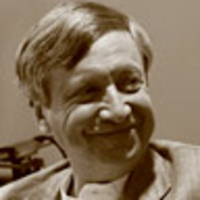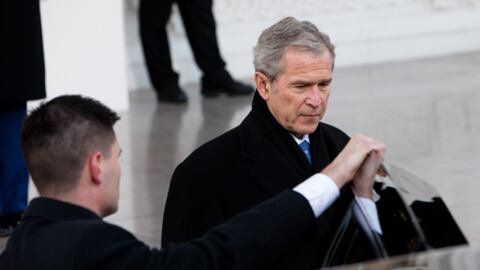
With his substantive inaugural address, Barack Obama repudiated the policies of “ The Worst President in History” and set a cogent agenda for the future.
“To choose our better history.”
In a phrase, President Barack Obama’s inaugural speech picked up the great democratic tradition of the American past and tied it to a declaration of purpose for the new administration. By respecting our founding principles, Obama promised, and by retrieving hard-won wisdom too long forgotten we can overcome our great challenges, foreign and domestic. A national spirit carried forward by generations of immigrants, slaves, sweatshop workers, and farmers—and guarded by patriots who fought and died—is stirring once more. And with that historical vision, Obama declared that one political era had ended and a new one had begun. It was enormously effective.
No longer will policymakers trash science for the sake of political advantage; no longer will religious faith be deployed as a partisan weapon.
For a year, Obama campaigned as the agent of change and hints of his campaign’s rhetoric and spectacle turned up at the inauguration. “O-BA-MA! O-BA-MA!” some in the audience shouted, as if the man striding to the front of the podium to take the oath of office was still just a candidate. But the heart of the speech involved explaining, in broad but cogent terms, what that change would entail over the period to come.
In 1981, Ronald Reagan ushered in the political age he dominated by proclaiming a few, basic conservative principles. Government had subjected the individual to the smothering embrace of “an elite group;” and so, he announced that he would “check and reverse the growth of government which shows signs of having grown beyond the consent of the governed.” In its place, he would substitute the magic of the free market and individual creativity—the forces that had permitted Americans to prosper "as no other people on Earth." And to “the enemies of freedom…our potential adversaries,” declared that America would never surrender, and would “maintain sufficient strength to prevail, if need be.”
In his first moment as president, Obama closed the age of Reagan by rebutting its first principles and addressing its failures. “The ground has shifted,” he said, and the “worn out dogmas, that far too long have strangled our politics” will be discarded. The important question, he stressed, is not whether government is too large or too small, “but whether it works—whether it helps families find jobs at a decent wage, care they can afford, a retirement that is dignified.” The market can create untold riches, but the current crisis has re-taught the old lesson “that without a watchful eye, the market can spin out of control—and that a nation cannot prosper long when it favors only the prosperous.” On foreign affairs, Obama pledged to win what he called the “war” against “a far-reaching network of violence and hatred,” but he emphasized the importance of “sturdy alliance and enduring convictions,” and a clear understanding “that our power alone cannot protect us.”
Obama also repudiated the extreme, deeply politicized version of Reagan conservatism implemented by President George W. Bush since 2001. The nation’s economic success, he said, depends not on the creation of wealth alone, but “on our ability to extend opportunity to every willing heart, not out of charity, but because it is the surest route to our common good.” He rejected “as false the choice between our safety and our ideals.” He called the country a home to many faiths—“and,” he pointedly added, to “non-believers.” No longer will policymakers trash science for the sake of political advantage; no longer will religious faith be deployed as a partisan weapon.
Obama’s speech successfully met an additional burden—to explain to the American people the magnitude of the nation's current difficulties and convey a sense of confidence. Obama pulled the presidency out of the state of denial into which it had drifted: “That we are in the midst of a crisis,” he said, “is now well understood.” He promised no quick fixes: so serious and numerous are the problems, “they will not be met easily or in a short span of time.” But they will be met, beginning with “bold and swift” action on the economy, both to curb mounting joblessness and lay the foundations for future innovation and growth.
There has been a good deal of twaddle in the press and on the op-ed pages lately likening Obama to Abraham Lincoln (or John F. Kennedy, or Franklin D. Roosevelt). Barack Obama will succeed or fail not because he is like any of his predecessors but because he is Barack Obama—as he was, very much, in his inaugural address. Anyone who expected a speech filled with aphoristic brilliance or soaring rhetorical flights or phrases that will turn into mottos was disappointed – because, in their hunger for a certain kind of heroic leader they have misjudged the new president. Instead, the speech was straightforward, at times almost conversational, precise, sober, laying out Obama’s general vision of our past, present, and future, without sounding visionary. This is Obama’s style as much as his ability to whip up crowds on the campaign trail—and I think it proved perfectly suited to the occasion today. He is who he is. What a relief!
That Obama quoted a president, George Washington, known for his actions more than his words was encouraging. Apart from a phrase in his Farewell Address about avoiding “entangling alliances,” I cannot think of a single memorable phrase that Washington ever wrote, including the prosaic if emboldening passage written at Valley Forge that the new president recited today. There was not a single memorable phrase of Obama’s in his inaugural address—which only proves that speeches can excel without being memorable. He intends to lead, the president told us today, and now let’s all get down to work. Amen to that.
Sean Wilentz is a History Professor at Princeton University. He is the author of numerous books, including The Rise of American Democracy: Jefferson to Lincoln and The Age of Reagan: A History, 1974-2008. A contributing editor at The New Republic, and historian-in residence at Bob Dylan's official website, he writes widely on music and the arts as well as history and politics.






